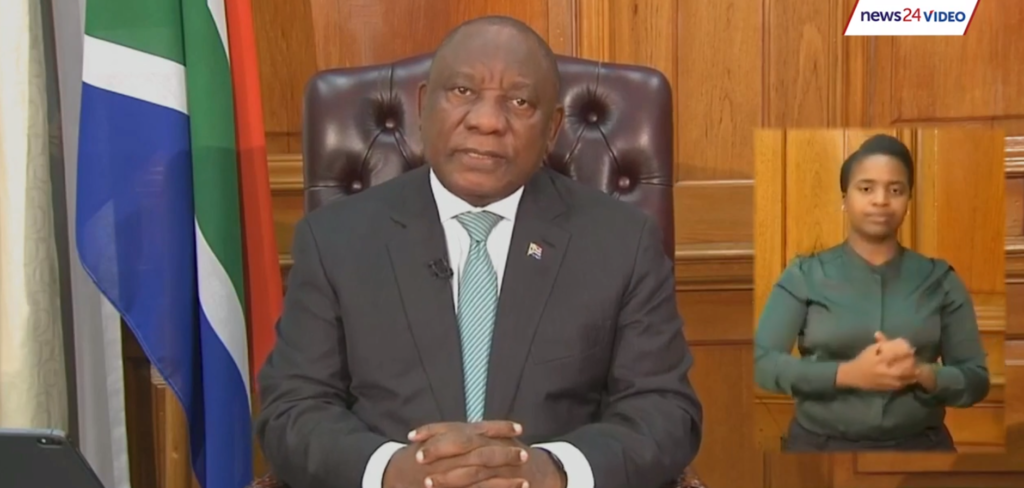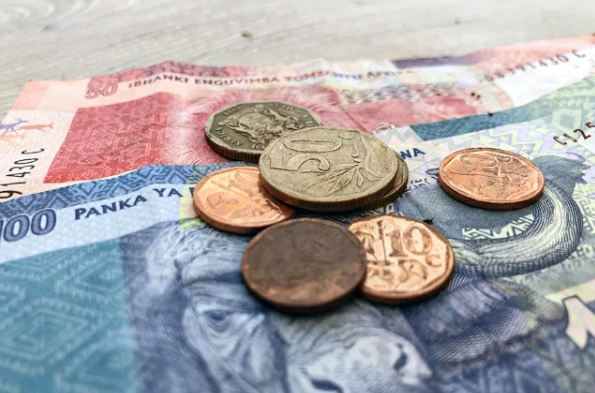The risk-adjusted approach is being finalised and will be elaborated on by the President Cyril Ramaphosa on Thursday evening. Treasury would not comment on questions about the document, and directed queries to the Presidency.
In the the 27-page document that outlines the impact on lifting restrictions on economic activity, Ramaphosa is advised that if economic activity is allowed to resume unabated there remains a risk of resurgence of Covid-19 infections. At the same time, some sectors remain vulnerable to retrenchments and business closures.
Treasury has already projected a deep recession during 2020, with a modest upswing in 2021. The Reserve Bank, meanwhile, has revised SA’s growth outlook and now expects a contraction of 6.1% this year. In comparison, the IMF projects a 5.8% contraction and Moody’s a fall of 2.5%.
Ramaphosa on Tuesday evening announced a historic R500 billion coronavirus support package in a effort to mitigate the impact of the virus the economy and to provide social relief.
The discussion document put forward projections of how different sectors of the economy would be impacted by what it called a “continued lockdown”. It did not specify how long the lockdown used in its modelling would last.
The nationwide lockdown – where only companies deemend essential like food retailers and pharmacies have been allowed to continue operating – is currently set to end at the end of April.
Extension
According to the predictions included in the document, if the lockdown were extended, the creative (arts and music), tourism, mining and oceans sectors would only be able to pay 5% of employees at the end of May. The construction industry is also in dangerous territory, with 15% of its workforce likely to be paid. The aviation industry will be able to pay just over a third of its workforce.
The film and tourism sectors will retrench just over half (55%) of their workforce, followed by aviation with less than half (45%) of employees to face job losses, according to the document’s projections.
The tourism sector will have business closures across the board, with three quarters of small and medium enterprises expected to be wiped out. The aviation sector is not far off, with 45% of larger firms expected to fail and 65% of small businesses to follow the same fate. More than half (55%) of small businesses in the clothing retail sector will also close down, and 65% of small businesses in the arts and music industries are projected to go under.
The discussion document proposed that restrictions on the movement of people and economic activity be adjusted, based on data on the control of the virus. Ideally government would adjust restrictions based on five alert levels, which will be informed by the risk of transmission. “At each level restrictions would be more or less severe, and sectors and companies would know what activity is permitted depending on the level imposed at any time,” it reads. The alert systems can be applied nationally, but the document proposes it be applied at provincial level. Premiers, with the approval of the minister of health, may then apply alert systems to districts.
As per the alert system recommendations:
- Level 5: Only essential services are allowed to operate.
- Level 4: This allows for food retail stores to sell a full line of their products, open cast mines to operate at full capacity and other mines only at 50% capacity, formal waste recycling and fibre optic and IT services are among those which can operate.
- Level 3: At this stage more businesses can operate – including clothing retail. Domestic air travel is introduced with restricted flights, passenger rail can operate – but with a restricted level of passengers. Liquor retail within restricted time frames is allowed and take-aways and online food delivery is allowed.
- Level 2: Domestic air travel fully restored, including car rental. Movement between provinces with level 1 and level 2 restrictions are allowed. All mines can operate at 100% capacity.
- Level 1: All sectors are fully operational, movement acros provinces allowed, international travel limited.
When it comes to lifting restrictions on the different sectors of the economy, the document states this will be determined by the risk of transmission within the sector, the impact of the lockdown in terms of retrenchments, company failures and loss of international market shares, as well as its contribution to the economy.
“Sectors with a high risk of transmission should not be allowed to resume activity until this risk is reduced, regardless of the potential impact on their sector or their value to the economy,” it said.
Based on its evaluations, the document shows that there is higher risk of transmission in the aviation industry, recreational, cultural and sporting activities and hotels and restaurants.
Chief economist of the Bureau of Economic Research Hugo Pienaar previously said that based on Ramaphosa’s announcement on the Covid-19 relief measures, it appeared government may be thinking of a slow process of opening up the economy. Sectors which might be “last on the list” to open up would mainly be those which require large gatherings – such as sporting events, bars or theatres, he said.
His comments were in line with the document’s proposal that whether a continued national lockdown is imposed or not, restrictions on hotels and sit-in restaurants, bars and shebeens, conference and convention centres, sporting events, cinemas, theatres and concerts, as well as religious and social gatherings will remain in place in some form.
Work from home
The discussion document advised that industries in the meantime adopt a work-from-home strategy, where possible. Workers over the age of 60 and those with one or more medical conditions identified by the department of health should also be allowed to work from home – or remain on leave with full pay.
Employers will also have to put in place new protocols at workplaces to screen employees on a daily basis for Covid-19 symptoms. Stringent social distancing measures must be adhered to, and where not possible, face masks are to be worn. Employers should also provide hand sanitiser and washing facilities with soap.
Each sector will have to agree on a Covid-19 prevention and mitigation plan with the minister of employment and labour, and the health minister and any other relevant minister.
Article by News 24
– With additional reporting by Kyle Cowan











